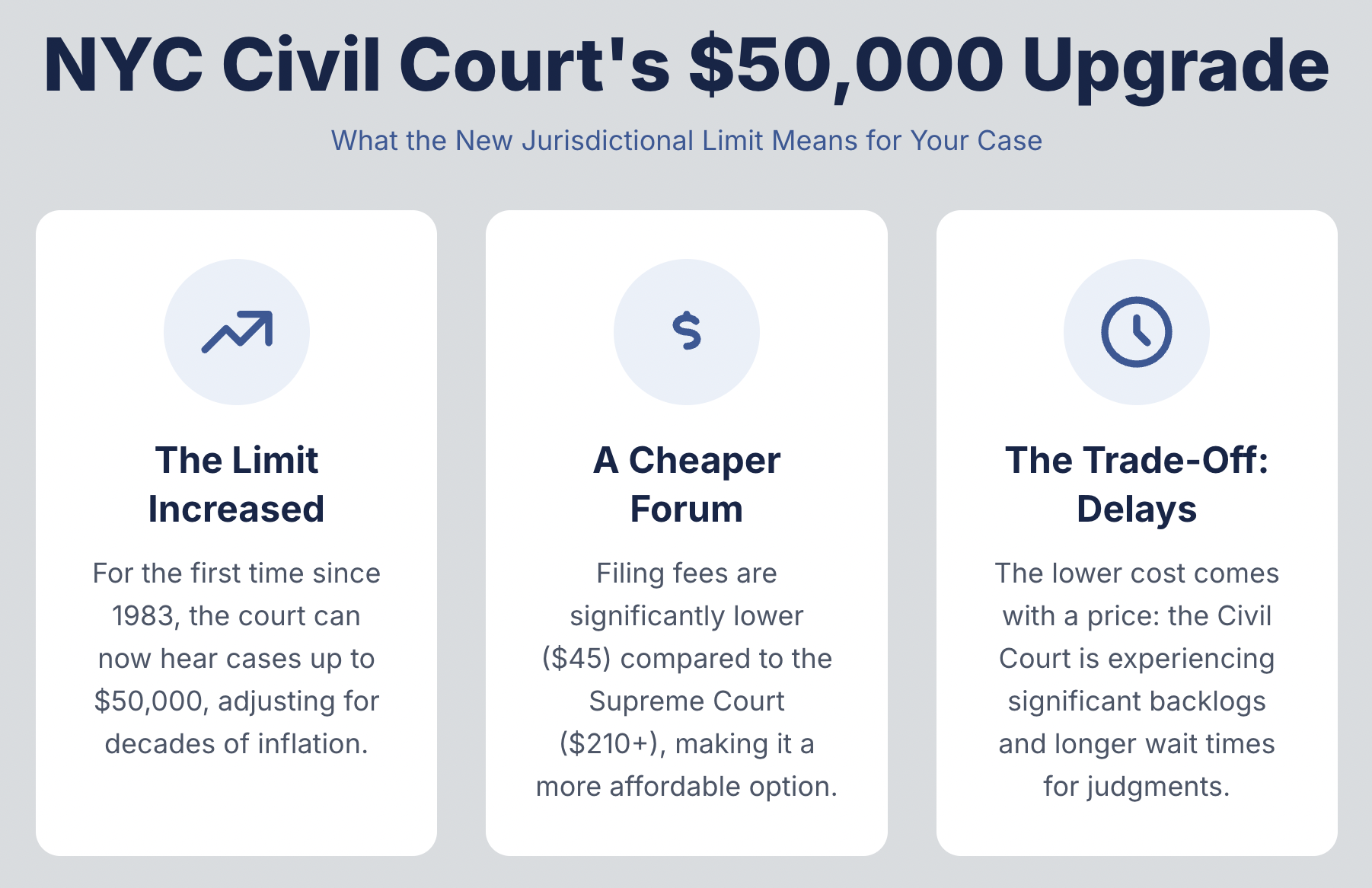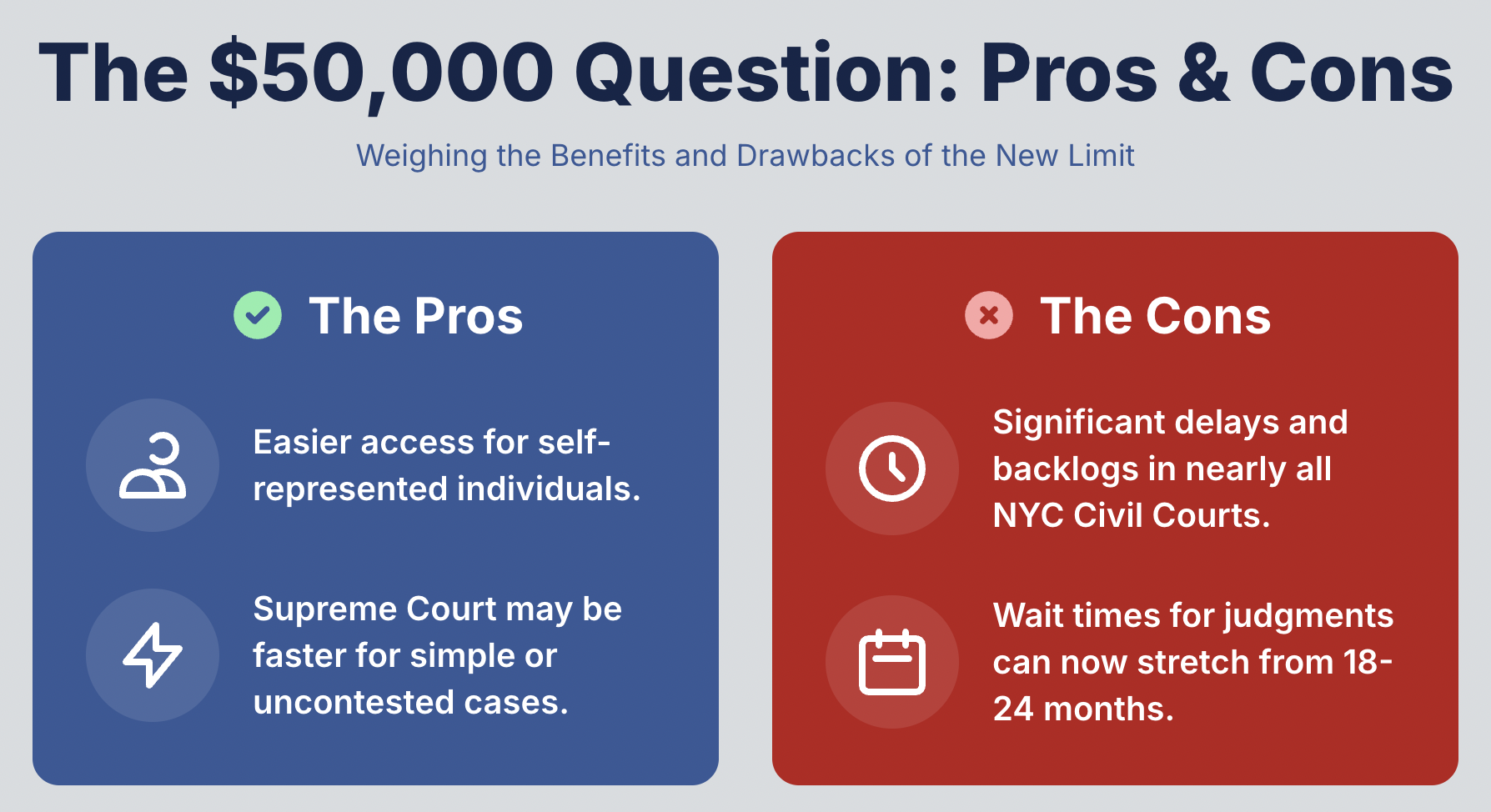 The New York City Civil Courts have increased their monetary jurisdiction for the first time since 1983. This change affects filing costs and the courts' efficiency. This overview will examine the reasons for this decision and its implications, especially for creditors and consumers.
The New York City Civil Courts have increased their monetary jurisdiction for the first time since 1983. This change affects filing costs and the courts' efficiency. This overview will examine the reasons for this decision and its implications, especially for creditors and consumers.
Comparison of Filing Fees: Civil Court vs. Supreme Court
Starting January 1, 2022, the New York City Civil Court raised its jurisdictional limit from $25,000 to $50,000. This change not only offers a more affordable court option for claims between $25,000 and $50,000 but also presents a stark contrast in filing fees: the Supreme Court charges $210 for an initial index number, while the Civil Court charges $45 for any non-consumer-credit action and $140 for a consumer-credit transaction filing.
The Supreme Court charges a $95 Request for Judicial Intervention (RJI) fee, which formally assigns the case to a judge. The civil court charges no such fee. Creditors can choose either court if the claim falls within Civil Court limits, but Supreme Court remains available for larger or strategic cases. They can still opt for the faster New York Supreme Court for cases likely to be uncontested or easily won. The Supreme Court of New York typically has more resources, including judges and administrative staff, which can contribute to a faster resolution of cases compared to the Civil Courts.

Money Threshold Increased Due to Inflation and Caseloads
This amendment, approved in a recent ballot, aims to account for inflation and alleviate the pressures on the already strained New York Supreme Court. The last such adjustment was in 1983 when the limit was raised from $10,000 to $25,000.
If you need help, complete this intake form.
Jurisdiction of New York Civil Courts
The Civil Court can handle cases involving amounts up to $50,000, including disputes over possession of items (replevin) valued within this limit. It also handles real-property actions within the $50,000 cap, such as partitions of real property and small-balance mortgage foreclosures. Additionally, the court can address issues related to property disputes, eviction cases, and contract adjustments, provided they fall within the set monetary cap.
Subject Matter Jurisdiction refers to the authority of a court to hear and decide cases of a particular type or cases relating to a specific subject matter. In other words, it's the court's power to rule on the particular issues in a case.
Common Money-Damages Actions Within the Civil Court’s $50K Limit
The NYC Civil Court predominantly deals with cases seeking monetary compensation. Common cases include:
- Various loans: from banks, credit cards, personal loans, and home renovations to student loans.
- Payment for delivered goods.
- Compensation for labor and services rendered.
- Outstanding hospital bills covering room charges, medications, or treatments.
- Fees for professional services, such as dental or legal assistance.
- Payments for trade services like plumbing or electrical tasks.
- Compensation for personal property damages, like car accidents or home damages.
- Personal injury claims.
- Claims by insurance companies seeking reimbursement after compensating their clients.
- Unpaid rent after a tenant has vacated.
- Disputes between commercial landlords and tenants.
Here are a few additional differences between the Civil Court and the Supreme Court in New York:
- Appeals: Some decisions from the Supreme Court may be appealed to a higher court, the Appellate Division, First Department, while the Appellate Term hears appeals from the New York City Civil Court and the New York City Criminal Court for New York and Bronx Counties.
- Location: The Manhattan branch of the Civil Court sits at 111 Centre Street; the New York County Courthouse at 60 Centre Street houses the Supreme Court (Civil Term) and the Appellate Term.
- Powers: The judges in the Civil Court can order the payment of money or fines and can resolve housing matters (landlord-tenant cases), but family-law issues are handled exclusively in Family Court. Judges in the Supreme Court have broader powers in both civil and criminal divisions. However, jail sentences are issued only in criminal proceedings, not in civil matters.

Procedure for Self-Represented Cases
When individuals represent themselves and file a case or respond to a case initiated by a lawyer, their case is automatically scheduled for a conference in the court’s Personal Appearance Part. Judges in this section manage all preliminary proceedings, from initial conferences to pre-trial motions, ensuring a streamlined process.
Implications for the Future
The increase in the monetary limit for the New York civil courts is a significant development that will have a lasting impact on the court system. It’s still too early to determine the long-term effects of this change, but early trends suggest it will significantly affect creditors, debtors, and court operations.
Here are some specific implications that could arise from the increase in the monetary limit:
- The Civil Court may become more congested as more cases are filed.
- The wait times for cases to be resolved may increase.
- There are concerns that the increased workload may challenge the Civil Court’s capacity, potentially impacting the quality of justice.
Overall, the increase in the monetary limit for the New York civil courts is a complex issue with far-reaching implications. It is important to carefully consider all of the potential impacts of this change before making a decision about whether to file a case in the Civil Court or the Supreme Court.


.png)
